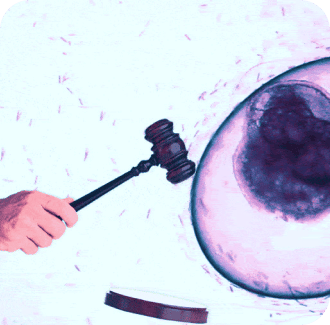Fertility Fraud: What You Should Know
Fertility patients grant their doctors significant trust when they rely on them to perform such procedures as in vitro fertilization (IVF) and artificial insemination. These patients have the right to informed consent. Likewise, egg and sperm donors have the right to direct the use of their reproductive material.

What is fertility fraud?
- The source of reproductive material used in insemination
- The manner in which reproductive material will be used
- The risks, benefits and costs associated with each procedure
Couples who seek artificial reproductive technologies (ART) are often desperate and may have attempted to conceive for several years without success. Some have surpassed the age of 30 or 40 and feel a sense of urgency to achieve pregnancy. They may have been diagnosed with one or more of the following:
- Male infertility
- Female infertility
- Idiopathic infertility


How is fertility fraud committed?

Fraudulent Insemination
Arguably the most egregious form of fertility fraud, fraudulent insemination occurs when a doctor inseminates a patient with his own sperm without the patient’s knowledge or consent. In most cases, the patient was led to believe the sperm was that of her husband or a carefully screened anonymous donor.
Theft and Misuse of Donor Eggs and IVF Embryos
In vitro fertilization requires the patient to undergo extensive hormone treatments to increase egg production. These eggs are then implanted with sperm from the husband, partner or donor.
This process creates several opportunities for fraud:
- Unused embryos could be used in another patient without the couple’s consent or knowledge.
- The doctor could use another woman’s eggs or another couple’s embryos during the procedure without the couple’s knowledge.
Fraudulent Use of Donor Sperm
Fertility patients are often allowed to peruse the details of anonymous sperm samples, such as the genetic profile and characteristics of the donor.
Fraud occurs when one or more of the following is practiced:
- The woman is inseminated with a different sperm sample
- The profile information was inaccurate, or the donor was not screened at all.
- The sample was used in excess of the number disclosed to the patient or donor.
Other Forms of Fertility Fraud
- Exploiting egg donors
- Clinics fail to warn donors of potential health risks, which may be substantial.
- Doctors pressure egg donors to continue the process even after complications arise.
- Doctors fail to acknowledge or treat complications.
- Using misleading success rates in fertility clinics
- Clinics refuse more challenging cases to inflate their numbers.
- Doctors prescribe unnecessary and risky prophylactic medications to boost their success rates.
- Practices fraudulently fail to include cases in their reports when patients drop out.
- Overstating the benefits of egg-freezing
- Engaging in the active concealment of adverse statistics such as high rates of miscarriage, neonatal deaths and physical disabilities in newborns
- Telling patients they are pregnant to ensure they continue coming to the clinic, and later telling patients they miscarried
- Endometrial scratching
- Embryo glue
- Multiple Ejaculation Resuspension and Centrifugation (MERC)
- Embryo time-lapse imaging
- Assisted hatching
- Pushing expensive treatments when less expensive, more effective options are available
- Failing to inform women of hidden costs
- Misrepresenting treatments to induce insurance companies to pay for procedures that are not covered
Fertility Fraud Laws
Although fertility fraud has occurred for decades, it has only recently been discovered. Thus only nine states have enacted laws that specifically address it. Even among these states, the legislation is new and may not address cases of insemination fraud that occurred decades ago.
The statute of limitations is another important consideration. Some states have a discovery rule, which allows the statute of limitations to begin tolling when the offense is discovered rather than when the acts were committed.
States with Laws Addressing Fertility Fraud
- Using reproductive material in any manner other than consented by the donor
- Implanting reproductive material without the written consent of the recipient
As of July 2020, fertility fraud in Colorado is specifically listed as unprofessional conduct and is a Class 6 felony that can incur up to 18 months imprisonment and a fine of up to $100,000. A civil action may be brought by the patient, spouse or children, with the right of each child to file a separate action.
As of June 2020, doctors who use reproductive material without the donor’s consent are guilty of a third-degree felony punishable by a $5,000 fine and up to five years of imprisonment. Doctors who use their own reproductive material are guilty of a second-degree felony punishable by a $10,000 fine and up to 15 years imprisonment.
Doctors convicted of these offenses are required to register with the police, and the offense is enumerated as unprofessional conduct.
As of April 2022, it is a class D felony in Kentucky to use reproductive material in any manner other than what was expressly consented to or for a doctor to use his own reproductive material without the patient’s consent. Donors, patients, spouses and offspring may file civil actions against offenders.
As of 2019, doctors who use their own specimens to inseminate patients in Texas are guilty of sexual assault and a felony in the second degree. The statute of limitations is two years after the discovery of the offense.As of 2019, doctors who use their own specimens to inseminate patients in Texas are guilty of sexual assault and a felony in the second degree. The statute of limitations is two years after the discovery of the offense.
States with Pending Legislation
The following state legislatures have introduced laws against fertility fraud:
- Illinois
- Iowa
- Michigan
- Nevada
- New York
- Ohio
- Oregon
- Pennsylvania
- Washington

Known Fertility Fraud Cases
- Dr. Donald Cline of Indiana - at least 94 cases
- Dr. Kim McMorries of Texas - at least 10 cases
- Dr. Cecil Jacobson of Virginia - at least 75 possible cases
- Dr. Morris Wortman - at least 7 cases
These cases are not limited to the United States.
- Dr. Bertold Wiesner of England - 600 possible cases
- Dr. Norman Tony Walker of South Africa - more than 100 suspected cases
- Dr. Jan Karbaat of The Netherlands - 49 cases


DNA Tests Revealing Fertility Fraud
Most of these cases occurred before the advent of commercially available DNA testing kits. These doctors most likely believed their actions would never be discovered. Companies like Ancestry.com and 23andMe offer a service that allows customers to discover other relatives who have used the service.
This is how Jacoba Ballard, offspring of Dr. Donald Cline, first discovered mysterious circumstances surrounding her ancestry. Although she had always known she was conceived through a sperm donor, she was shocked to find the large number of siblings that had been conceived through the same donor. This led to her search and ultimate discovery of the truth.
With the growing popularity of commercial DNA testing, the number of cases will undoubtedly continue to rise. The good news is that fertility doctors can no longer cloak these grievous acts in a shroud of secrecy.
What to Do If You Are a Victim of Fertility Fraud
If your family has been victimized by a fertility doctor, your recourse will vary based on the state where you live. This issue has only recently garnered public attention, and an increasing number of states are responding with legislation.
Whether your state has enacted such legislation or not, you can and should take steps to hold the doctor accountable, even if your only remedy is public exposure. Public exposure provides a form of accountability and prompts lawmakers to take action to ensure this conduct does not continue without penalty.
Proving the Case
To prove a case of illicit insemination, you will need proof that the mother underwent artificial insemination while under the alleged doctor’s care. Access to the doctor’s DNA would be ideal, but this could be challenging to obtain.
If the doctor has a known close relative who is willing to help, the case may be provable through the family member’s DNA. If the case is criminally prosecuted, the state may order the doctor to provide DNA.
The most important step is to contact a fertility fraud lawyer who can advise you of your legal options. Depending on the laws of your state, you may be able to file the following types of civil actions:
- Medical malpractice
- Outrageous conduct
- Negligent acts or omissions
- Fraud
- Negligent misrepresentation
- Breach of contract
- Medical battery
Why the Fraud Must Stop
Fertility fraud is a violation of a patient’s reproductive rights. Illicit insemination is an exceptionally intimate violation that borders on sexual assault, and it harms everyone.

It robs individuals and couples of their right to reproduce as they see fit.

It exposes the offspring to genetic diseases and predispositions without their knowledge.

It exposes the gene pool to the possibility of close relatives marrying and reproducing without knowledge of their biological connections.
Thanks to modern technology, fertility fraud has been exposed. If your family has been impacted by fraud, contact Stein Law today for a free consultation.